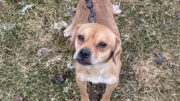Just as 33-year-old Scott Kennedy was getting his new business up and running in Oil City, the COVID-19 pandemic went rampant.
The coronavirus spread shut down bars and restaurants, emptied stores, launched remote learning, required working at home, curtailed travel plans and much more.
For Kennedy, all that was key to his new enterprise of shuttling customers to stores, restaurants, airports and an array of other destinations.
“I got my PUC license in December 2019 and by March, the business was actually doing pretty well,” said Kennedy, a native of Florida who moved here with his family in the early 1990s and graduated in 2006 from Oil City High School. “Then, my ride numbers slipped because people didn’t want to go anywhere. Really, couldn’t go anywhere. They were afraid. It just dried up.”
For Kennedy, giving people safe rides came naturally.
“I had a car and my friends would ask me to drive them somewhere,” he said. “A friend planted the seed for starting a business when he suggested I could be a designated driver for people.”
‘I just pushed and pushed’
Kennedy got a Certificate of Public Convenience license from the Pennsylvania Public Utility Commission, bought liability insurance, spiffed up his for-hire vehicle and signed on an independent contractor to work as a second driver. He chose Here-2-There as the name for his 24-hour taxi service.
“I was all set and started January 15 to offer rides,” he said. “I did rides to the Pittsburgh airport, to local restaurants and bars, to appointments and more. Then everything paused and no one was going anywhere. I kept trying and went to small businesses to give out my business cards because we try to help each other. I just pushed and pushed and pushed.”
His “maybe $800 to $1,000 a week income” was cut by more than two-thirds. Kennedy was nearing a decision to close up shop.
“It really hit and perhaps I was too optimistic that I wouldn’t be affected by the virus. I felt people still needed to go places but they really weren’t doing that,” he said.
Struggling to stay in business, Kennedy approached UPMC Northwest with the idea that he could provide, via a contract, transportation for patients, families and staff. In September, a deal was reached.
Meanwhile, he worked to get the word out about his taxi service with advertising, signs, promotions and a hefty social media presence.
“Business is beginning to pick up as more people know about me,” said Kennedy. “I want to expand to more drivers, move the office out of my West Third Street home into a real office, have a bigger fleet. I think I can do it, especially after going through such a drop in business and then figuring out how to come back. The thing I did the most was to listen to advice and suggestions.”
As to advice for a small business that is working hard to survive, Kennedy said, “I was so worried that I would fail. But I learned that you don’t ever take anything for granted. If things change, you just keep trying and trying. That takes a lot of hard work.”





































